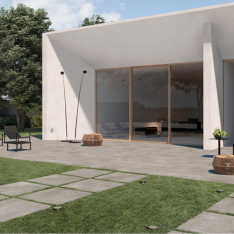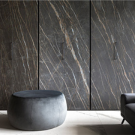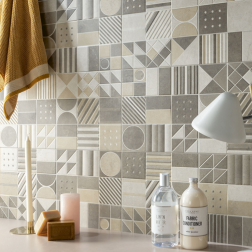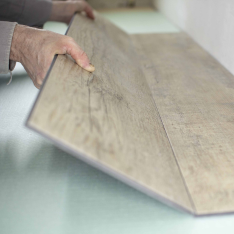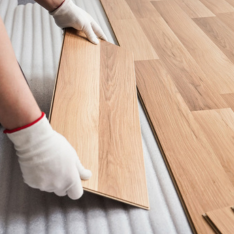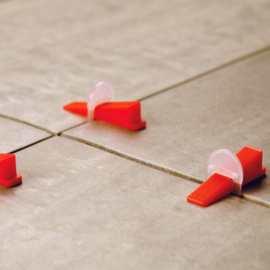When it comes to flooring, stoneware is often the first option that comes to mind. However, today there are numerous alternatives to stoneware flooring that not only offer aesthetics but also functionality and sustainability. With the evolution of materials, the possibilities for your indoor and outdoor spaces have expanded significantly. In this article, we will explore several innovative solutions that can transform your environment, improving both design and practicality.
The Evolution of Flooring: Beyond Traditional Stoneware
In recent years, the demand for innovative flooring has increased exponentially. Why limit yourself to stoneware when there are so many options on the market? The evolution of flooring has been driven by several factors, including sustainability, aesthetics, and ease of maintenance.
The new materials, in addition to improving the appearance of environments, have been designed to meet specific needs, such as resistance to humidity, ease of cleaning, and longevity. In this context, alternatives to porcelain stoneware flooring stand out as practical and attractive solutions for every type of space, from the kitchen to the living room, up to gardens.
Furthermore, growing environmental awareness has pushed many manufacturers to develop eco-sustainable materials. This trend not only promotes conscious consumption but also offers options that can reduce the environmental impact of your home. With all these possibilities, it's clear that the future of flooring is brighter and more varied than ever.
Innovative Materials for Modern Flooring Alternatives to Stoneware
Modern flooring options offer a range of materials that adapt to any style and need. Each material has unique characteristics, which can influence not only the aesthetics but also the functionality of your space.
Here's a list of some of the most innovative materials available:
1. Alternative Solutions to Stoneware Flooring: Resin
Resin floors are gaining popularity thanks to their versatility and modern look. This material is composed of synthetic resins that can be applied in different finishes and colors, making it ideal for contemporary environments.
Resin is highly resistant to humidity and scratches, which makes it perfect for high-traffic areas such as kitchens and bathrooms. Furthermore, its smooth surface is easy to clean and maintains an impeccable appearance over time. Another interesting feature is the possibility of creating custom design effects, such as textures or shaded colors, thus allowing you to express your personality through the floor.
However, it is important to consider that the installation of resin requires experience and professionalism. Incorrect application can lead to problems such as cracking or detachment. Therefore, it is advisable to rely on professionals in the field to ensure an optimal result.
2. The Charm of Microcement for Interiors and Exteriors
Microcement is another fascinating option for those looking for an elegant and modern floor. It is a cement-based composite material that can be applied to different surfaces, including stoneware, tiles, and wood. This feature makes it extremely versatile and suitable for both interiors and exteriors.
One of the main advantages of microcement is its ability to create a uniform and continuous appearance. This is particularly useful in open spaces, where you want to maintain a certain visual fluidity. Furthermore, microcement is available in a wide range of colors and finishes, offering endless possibilities for customization.
On a practical level, microcement is resistant and durable, but it is necessary to pay attention to maintenance. Although it may seem easy to clean, it is advisable to use specific products to preserve its beauty over time. With proper care, microcement can become a long-lasting and high-impact aesthetic choice.
3. Vinyl Flooring: Versatility and Resistance

Vinyl is one of the most popular alternatives for flooring, thanks to its combination of versatility and resistance. Available in a wide range of designs, colors, and textures, vinyl can imitate more expensive materials such as wood, stone, and ceramic, making it an economical choice for those who want an elegant look without spending a fortune.
Resistance to humidity and ease of maintenance are among the main advantages of vinyl. It is ideal for areas prone to contact with water, such as kitchens and bathrooms. Furthermore, its soft surface offers a certain degree of comfort underfoot, making it a popular choice also for children's play areas.
However, it is important to note that vinyl can scratch more easily than other materials. It is advisable to use rugs or protections for heavy furniture to avoid damage. Despite this, its durability and its aesthetic appearance make it a valid alternative to stoneware.
4. Alternative Solutions to Stoneware Flooring: The Versatility of Laminate

Laminate floors have become increasingly popular in recent years thanks to their versatility, aesthetics, and ease of maintenance.
Laminate floors are available in a wide range of finishes, perfectly imitating the appearance of various natural materials such as wood. This allows you to create a customized and trendy environment. Furthermore, laminate slabs are very resistant to wear, scratches, and stains, making them ideal for high-traffic areas such as hallways and kitchens. Finally, cleaning the laminate is very simple: just sweep or vacuum regularly and clean stains with a damp cloth. Also, the simple installation shouldn't be underestimated, even for those who are not experts.
However, laminate has limited water resistance. Therefore, in very humid environments, such as the bathroom, it is advisable to opt for a more waterproof material.
5. SPC Floors: A Sustainable Choice

SPC (Stone Plastic Composite) floors are gaining more and more popularity in the renovation and furnishing sector thanks to their unique characteristics.
SPC floors are composed of a mix of polyvinyl chloride (PVC) polymers and limestone powder. This combination gives them superior rigidity and dimensional stability compared to traditional PVC floors, as well as a more natural and authentic appearance.
SPC floors represent an excellent alternative to traditional floors, offering a great balance between aesthetics, resistance, and practicality. If you are considering renovating your floors, it is worth seriously considering this option.
How to Choose the Right Alternative for Your Home
Choosing the right alternative for your flooring depends on several factors, including style, functionality, and budget. Here are some tips to help you make an informed decision:
- Style and aesthetics. Consider the style of your home and which material best integrates with the existing furniture. If you have a modern style, materials such as resin or microcement may be ideal. For a more traditional look, laminate or composite may be right for you.
- Functionality. Evaluate how you will use the spaces. If you have children or pets, it may be wiser to opt for resistant and easy-to-clean materials, such as vinyl or resin. For areas subject to humidity, consider materials specifically designed to withstand water.
- Budget. Finally, consider your budget. Some materials, such as microcement, may require a higher initial investment but may prove to be more economical in the long term thanks to their durability. Compare the costs and benefits for each option.
Conclusion: What Alternatives are There to Porcelain Stoneware Flooring
In an ever-evolving world, flooring options have expanded considerably, offering innovative and sustainable solutions. Whether you are looking for elegance, practicality, or sustainability, there are products suitable for your needs.
Take the time to explore the different solutions available and carefully consider your needs. Don't forget to evaluate the budget and maintenance costs, so that you can make an informed and lasting choice.
If you are ready to transform your spaces with innovative flooring, discover our selection of flooring to start your project. Numerous options await you, ready to bring freshness and style to your home!



